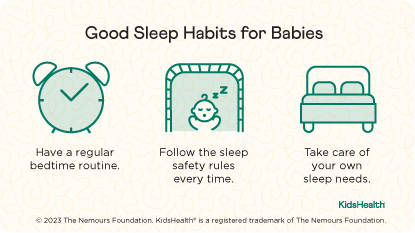Sleep is important for children's growth, development, and overall health. Help your baby develop good sleep habits early so they can get the sleep they need.

Create a regular bedtime routine. A bedtime routine should include:
- Quiet activities, such as bathing, changing diapers, reading, or singing.
- Feeding or nursing your baby. Do not put your baby to bed with a bottle of formula, milk, or juice. The sugars in these liquids can rot their teeth.
- Putting your baby in the crib, bassinet, or portable crib when they first become drowsy but aren't yet asleep. This way your baby can learn to fall asleep on their own.
When your baby wakes during the night:
- Feed your baby, change their diaper if needed, then put them right back in the crib, bassinet, or portable crib. Keep the lights low and your voice quiet.
- If your baby is older than 1 month, has fed in the last 2 hours, and your health care provider says it's OK, let your baby fuss for a few minutes. This gives your baby a chance to settle and fall back asleep without you. If the fussing goes on:
- Go and check on your baby. Change their diaper if needed.
- Soothe your baby without picking them up. Try rubbing their back or singing quietly.
- When your baby is calm, leave. Let your baby try to fall asleep without you.
- If your baby starts crying or more than 2 hours has passed since the last feeding, they may be hungry and need to feed again.
Keep your baby safe while they sleep. To help prevent sudden infant death syndrome (SIDS):
- Always place your baby to sleep on their back.
- Put your baby in a crib or bassinet that meets all safety standards. Never put wedges, sleep positioners, pillows, blankets, bumpers, or toys in the crib or bassinet.
- Keep the crib or bassinet in the room where you sleep for at least 6 months and, if possible, for your baby's first year. Never let your baby sleep in bed with you.
- Breastfeed your baby or give them breast milk that you pumped, if possible.
- Give your baby a pacifier at nap time and at bedtime. If your baby is breastfeeding, wait until breastfeeding is going well before using a pacifier, usually when your baby is about 3–4 weeks old.
- Don't let your baby get too hot while sleeping. Keep the room at a temperature that is comfortable for a lightly clothed adult. Don't bundle them up or cover their head. If your baby shows signs of overheating, such as sweating, remove some of their sleepwear.
- Do not fall asleep in bed or on a couch or chair while holding your baby.
- If your baby falls asleep in a car seat, stroller, sling, or baby carrier, move them to the crib or bassinet as soon as possible.
- Don't let anyone smoke around your baby. If you or someone in your household needs help quitting, call 800-QUIT-NOW (800-784-8669) or visit smokefree.gov.
- Make sure everyone who cares for your baby follows these safe sleep practices.

You are so tired or frustrated with your baby not sleeping that you are worried you may hurt them. Never shake your baby. This can cause serious injury, including brain damage, or possibly even death.

How much sleep does my baby need? Although it can vary, most babies need:
- About 14–17 hours a day in the first 3 months of life
- About 12–16 hours a day from 4–12 months of age
At first, babies may sleep only an hour or two at a time, and their sleep is spread throughout the day and night. But as they grow, they usually start sleeping longer, with more sleep taking place at night.
When will my baby sleep through the night? Babies start sleeping through the night at different ages. By 3 months old, some babies can go 6–8 hours at night without feeding but others take longer. Most 1-year-olds are sleeping 8 hours or more most nights.
How often should my baby nap? Newborns take many naps throughout the day. By a few months, most babies are taking 2–3 naps during the day. By 1 year, most babies are taking only 2 naps a day. However, napping schedules can vary in different babies.
Can I swaddle my baby? Some babies like to be swaddled (wrapped in a light blanket). Swaddling is OK until they start to roll (typically, when they're 3–4 months old).




